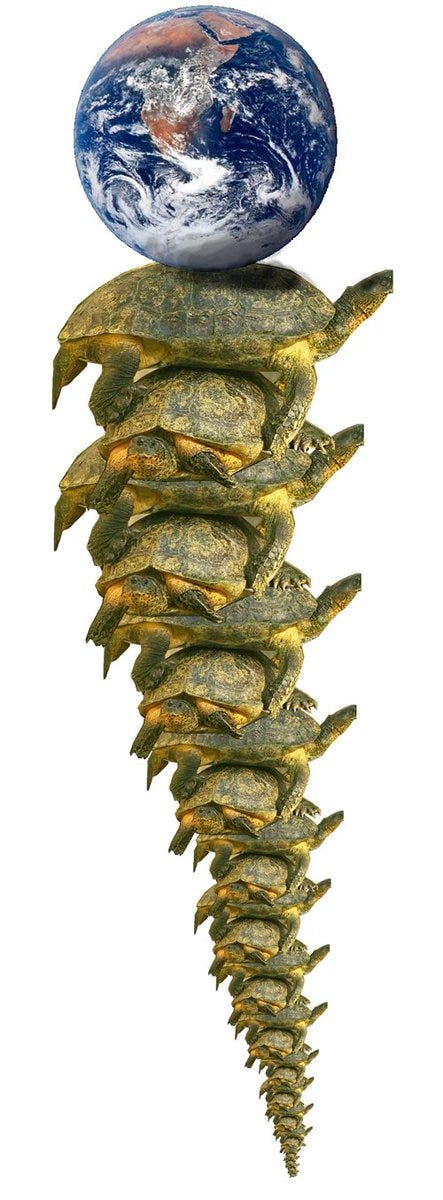I don’t actually believe we live in a simulation. Necessarily. The arguments are pretty convincing though. And I have another novel, I think, observation to add to the evidence that we aren’t inhabiting base reality: the fractal character of what we learn when we apply scientific inquiry to smaller or deeper scale is what we might expect in a simulation. I’ll come back to it it after a bit of context.
Are You Living In a Computer Simulation?
Most people have heard the argument that it is likely we are in a simulation from Elon Musk, an outspoken believer. And before him was The Matrix.
The original formal treatment comes from a more rigorous and less flamboyant source. In his 2003 paper, “Are you Living in a Computer Simulation,” Nick Bostrom, Professor, University of Oxford and Director, Future of Humanity Institute, argued:
…at least one of the following propositions is true: (1) the human species is very likely to go extinct before reaching a “posthuman” stage; (2) any posthuman civilization is extremely unlikely to run a significant number of simulations of their evolutionary history (or variations thereof); (3) we are almost certainly living in a computer simulation. It follows that the belief that there is a significant chance that we will one day become posthumans who run ancestor-simulations is false, unless we are currently living in a simulation. A number of other consequences of this result are also discussed.
He argues his points with dizzying erudition, and one finds oneself reluctantly swayed. It is discomfiting to have someone (who has argued himself into non-existence) prove you aren’t real with only math. It’s straight from Douglas Adams’ Hitchhiker’s Guide to the Galaxy which probably makes it true. One wants to riposte with some equally abstruse counter-argument like the anthropic principle. It would seem that Bostrom dispels that possibility in:
N. Bostrom, “The Doomsday argument, Adam & Eve, UN++, and Quantum Joe.” Synthese 127(3): 359-387 (2001) ; and most fully in my book Anthropic Bias: Observation Selection Effects in Science and Philosophy, Routledge, New York, 2002.
…but i don’t know because I haven’t read it in spite of the amusing title.
Bosworth also tells us we’d better not believe him because if we do, and stop acting like we believe we have free will, we’ll ruin the whole point of the simulation and the simulators will turn us off and start over with a fresh batch!
And, if this didn’t already make us feel insignificant, the likelihood is that the simulation was built by beings who are themselves in a simulation, the math applying inexorably to them just as it does to us.
Heady stuff!
My Bit
My modest addition to all this is to point out an aspect of scientific observation that is surprising to us, but which is exactly what we’d expect if we lived in a simulation.
In a computer game, you can chase down any one of endless rabbit holes to any depth with full detail for as long as your patience holds out. The game doesn’t have to have infinite detail everywhere, just to be able to fill your screen wherever you pay attention to one or another corner of the simulation. Generating the detail on the fly is a computationally efficient solution to providing apparent infinite detail — create it only on when someone is looking.
This is precisely what we see in nature. Look inside living tissue and you find cells. Look inside cells and you find nuclei, organelles, molecules. Look into those and you see … more stuff.
Break apart atoms and you find electrons and nuclei; inside nuclei there are sub-atomic particles, a bestiary of quarks, leptons, muons, Higgs Bosons, ad infinitum.
This is exactly what we’d expect if we were in a simulation. The closer we look, the more detail the simulation fills in.
At whatever scale we investigate, nature endlessly recapitulates, surprises, and provides novel, deeper and more mysterious structures. There seems to be no bottom. It’s turtles all the way down. Which is curious because it flies contrary to our fundamental belief in a modern atomism, that, at the deepest level, reality is made of indivisible and simple building blocks and we shouldn’t need a whole new physics for each new scale of reality we observe.
It Gets Worse
Even if we turn out not to be in a simulation, and you are ready to take comfort in that, Nick Bostrom has an even more frightening theory about why life is not likely to survive, the Vulnerable World Hypothesis. It says that the fact that we don’t see signs of life all over the universe means all civilizations quickly hit an existential event horizon and perish. Not some, he argues, all.
In Which Case
It’s likely all civilizations are going to perish, if were even alive in the first place, so that should take some of the pressure off. I, for one, feel less guilty about staying up late last night watching a replay of The French Open.
Marc Meyer is a Silicon Valley technologist, founder (6 startups, 4 exits, 1 IPO), engineer, executive, investor, advisor, teacher and coach. He has invested in and advised over 140 companies. He advises and works with accelerators and funds including Alchemist, 500 Startups, HBS Alumni Angels and Berkeley SkyDeck, where he chairs the Advisor Committee. He has an Executive Coaching practice helping leaders navigate towards their greatest potential.






